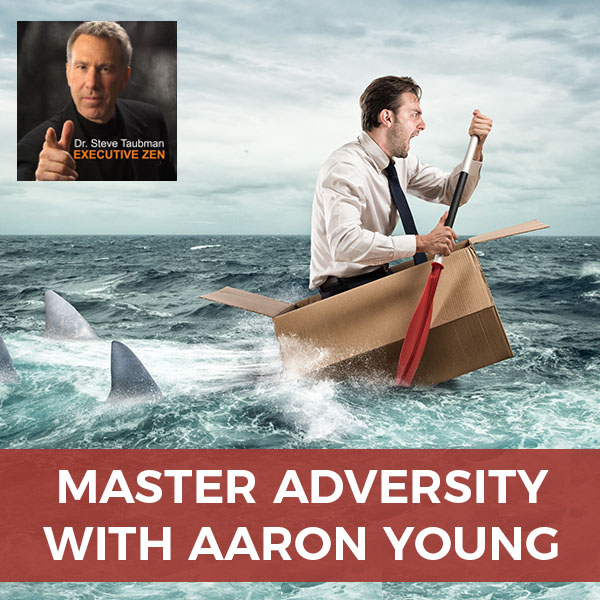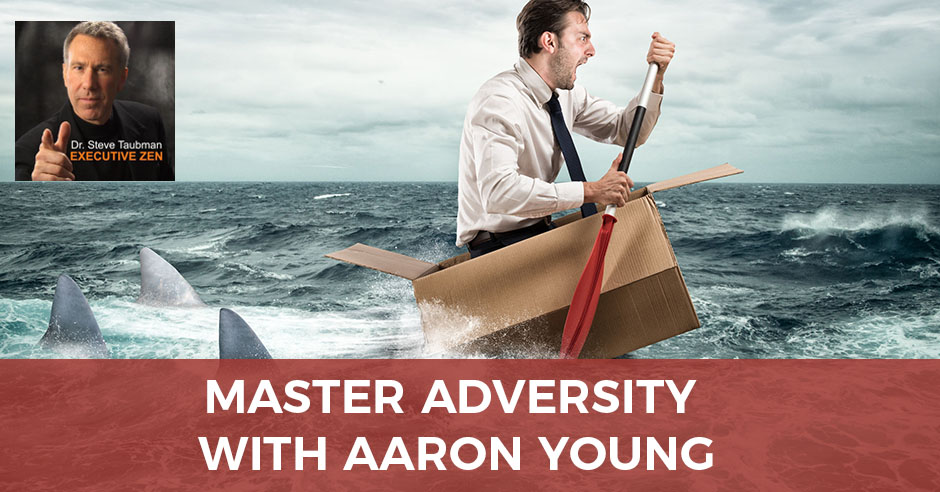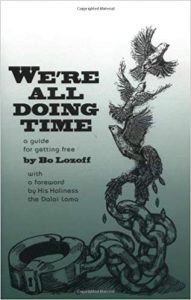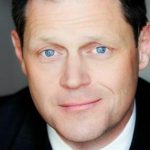

In this episode, I speak with business turnaround expert, Aaron Scott Young, about how he managed to take a major life setback and use it to his advantage. Not to telegraph too much of the story, but if you’re a Shawshank Redemption fan, you’re going to LOVE his tale!
As a trainer, consultant, and serial business owner, Aaron brings great wisdom and insight into the conversation about success.
I personally felt inspired by Aaron’s words as well as by his spirit and his ability to turn adversity into prosperity! Another great one! 🙂
—
Listen to the podcast here:
Master Adversity with Aaron Young
Our topic is adversity. Our guest, Aaron Scott Young, has taken his adversity and rolled it into his message. In the last episode, I said something that a number of people commented on. I said, “Success leaves clues.” I had a few people specifically email me and said that was meaningful to them. I said, “If you’re smart, you’ll keep an eye out for what those clues are.” As we move through this process and as we start learning more and more about what it takes to jump to the next level, start looking for the clues that determine or define what success is for you. For those who have made a successful run of it, we’ll be looking at how most people operate versus how the world-class thinkers operate. We could all agree that nowhere is the right mindset important, nor is the ability to know what those clues are more important than when facing adversity. If you know how to do that, you can be a great leader.
The problem is that we often cave in quickly when we start to experience adversity. We’re wired for things going our way. We love it when we set a plan, create a vision, and communicate the vision to others. They accept the vision, they move forward with that vision, and everything happens effortlessly. Unfortunately, it almost never happens. Somewhere along the way, from the point when our minds conceive a vision to the point where that vision becomes manifest, there are many touch points along the way where obstacles might arise. We might get fuzzy about our own vision. We might be unclear about what it is. We might have some difficulty communicating it to others. We might find that the people to whom we’re communicating are stuck in their own stuff. They haven’t fully engaged in our vision. They may be putting up walls.
There are two kinds of walls that people tend to put up in the process of trying to achieve success and that you are making every effort to communicate something that’s wonderful and successful. If you’re meeting obstacles, it tends to be because either the individual to whom you’re speaking hasn’t received the communication or that they are what is called counter intending. They literally don’t want you to succeed with that vision. They’re angry at you. They’re irritated with you. They have a better way in their mind.
The successful entrepreneur or the successful owner roots out what are the obstacles that occur between the time I create a vision and the time I communicate it to others. Once it’s out there in the world and among the people who are meant to execute it, I’m not seeing anything blocking my way. I’m minimizing my adversity by minimizing the number of representatives in my world who are either counter intending, that is not wishing for success, or is at cross purposes in some way. Maybe their mind is elsewhere, they see something else as important. That’s one of our biggest forms of adversity is understanding what those blockages are.
Out in the world, what are the external obstacles? What are the things that have caused our adversity? Are they government regulations? Is it a competition? Is it change? Is it something in the economy that’s influenced what we’re able to accomplish? Is it that we had a great idea when it was a great idea, but now that we’re executing it, suddenly technology has changed and we can’t do it that way anymore. There are many things that can pose obstacles to us and create adversity for us. What the great leaders do and what’s required is taking these moments of realizing that we’re up against something, whether it’s an internal communication or an external obstacle. Becoming the Zen master, what’s required of us, as leaders, is to be Zen-like, centered and wise. For that wisdom to inform the way that we do what we do. Rather than approaching our obstacles as the victim, we use “what is” as a stepping stone to “what can be.”
The first step for using “what is” is being willing to acknowledge “what is.” We need to understand that our obstacles or adversity is not something to reject, but rather something to embrace. As we go through these episodes, we’ll be learning more about the tools like meditation and mindfulness tools. To help you to naturally experience your so-called unwanted experiences in a way that allows you to embrace them and move forward with them. We have an absolutely wonderful guest. I’ll be speaking with a great business consultant about adversity, both his and that of his clients. How he and they have stood in the face of challenges, like the ones he’s faced, the ones they’ve faced, certainly the ones that I faced and no doubt, the ones that you faced. Our topic is adversity. I’ll be speaking with the author, speaker and world-class business consultant, Aaron Scott Young.
—
I’ve got Aaron Scott Young. He is a lifelong entrepreneur, a trusted advisor to CEOs and business owners, and creator of The Unshackled Owner, a program for entrepreneurs looking to build a business and not just a glorified job. Aaron is a Chairman and CEO of Laughlin Associates, a 44-year-old company that’s helped over 100,000 entrepreneurs start, grow, and profit from their business. Aaron has gained an ideal vantage point to observe common mistakes and successes in businesses all the way from mainstream America to America’s largest yacht broker for medical professionals to manufacturers to investors. For over 34 years, he’s experienced founding, acquiring and directing multimillion-dollar businesses. Working as an officer for a publicly-traded multinational has set him apart from the crowd as a voice of real knowledge and authority. I met Aaron at an event called Secret Knock. We sat down and had an awesome conversation over lunch. The topic of adversity sparked my interest when I was talking to Aaron. He’s had some in his life and it spreads out into an interesting conversation. Are you in Reno?
Success leaves clues. Click To TweetNo, I live in Washington State, I’m in Southwest Washington. Laughlin Associates is in Reno. It’s been there for 46 years. I’m an absentee. I’m a distance owner.
Aaron, welcome to the show. I’d like you to cover a few of the low points, but I’m going to let you start by taking us back and a little bit of the backstory of your career.
I’m going to be 54. I was born 1964 down in Southern California. My dad was the director of sales and I got transferred from LA up here. As I grew up in Portland, we didn’t have a lot of money. I learned early on that if I was going to have a pair of those new Nike shoes. If I was going to have some Britannia scroll jeans or something that was popular back in my teenage years in the late ‘70s, early ‘80s, I’d have to make some money on my own. I started my first real business with employees and payroll right before my 19th birthday. I had a series of things where I build something up and sell it or build something up and crashed into the dirt. We kept failing forward.
In the ‘90s, when I was 29 years old, I was Vice President of Sales of the big board Nasdaq, 350 offices around the world financial services company. Thankfully, being in charge of the sales side of the business, we did well. The stock went way up and I made a lot of money in the stock. After three-and-a-half years there, I left and started acquiring businesses or starting new things, mostly buying. I have been doing that ever since. It was in ‘97 when we bought the first company.
Have you found over time that you’ve developed any formula or is there anything that you look for as you go into acquiring a business in particular about the human capital?

Master Adversity: The Unshackled Owner believes it is not about selling your company. It’s about building an asset that will stand when you’re there and when you’re not there.
There is a formula. The Unshackled Owner class that I teach is all based on the formula. I didn’t know I was developing a formula, I was just doing my thing with me, head down in the trench, working. It wasn’t until when I was asked to be the opening keynote at a thing called Exit Planning Institute, it’s lawyers and CPAs who specialize in helping companies get ready to sell, that I thought, “Why the heck did they want me to be their opening keynote? All these lawyers and CPAs specialize in this, why do they want little old me coming over and talking to them?” The guy in-charge of Exit Planning Institute said, “You are buying and selling. You’re not just doing the legal work or the accounting work. We want to know what you look for.”
In an effort to put that keynote and workshop together, I worked with them for three hours that day. I had to boil down what have I always done that seems to work and what I repeat. That became The Unshackled Owner class that I teach now. There’s definitely a formula. I’ve helped over 120 other companies go through the formula and get great results. The thing that I’ve learned is most business owners’ stay in startup mode and they never get out of startup mode. They stay the most important employee in their business. They stay the critical element of every major decision. Consequently, their business can only get as good as they are. The fact is most of us, entrepreneurs, suck as managers. We shoot ourselves in the foot by being control freaks. The Unshackled Owner idea is not about selling your company, it’s about building an asset that will stand when you’re there or when you’re not there. The whole idea is do you have a glorified job? Do you own assets that are a dry cleaner, a restaurant, a manufacturing company or dental practice? Are you just the senior employee?
Unfortunately, we’re often wired for things going our way. Click To TweetI was a chiropractor for many years, I ended up selling my chiropractic practice. Thankfully, we had put some systems in place and implemented some strategies. By the time I left my practice, my practice could survive without me. My practice wasn’t just me. That’s not the case for everybody, is it?
No, I’ve worked with clients that are small as half a dozen employees and as large as 1,600 employees in this program. What happens is to a certain extent, you can keep a lid on things. Once you start to have multiple locations, you start to have multiple divisions, there starts to be little fiefdoms created inside the company of this manager or this VP is controlling their turf. It can become difficult. It’s why they usually want the founder to stay on working for a few years when a company is purchased. It doesn’t have to be that way. The problem is most founders, whether they’re a great leader or not, don’t have those systems put in place so that they can be gone. The topic you want to get to at some point, I might have a great proof of concept about that formula.
The idea that a formula became evident to you, that you didn’t start out saying, “This is my formula,” but you looked backward and said, “I guess that was my formula.” That speaks to something, which is, “Success leaves clues.” The clues were there. You happened to, as a result of being asked, turn around and look at that. That happened to me when I wrote my first book, UnHypnosis. I had to sit down and look at, “What do I believe? How do I articulate what I believe? If I were to make it systematic, what would it look like?” Most companies stay in startup mode, they remain the most important person in their business. Most of them suck at management. How much of this is systemic and how much of it is psychological? If you run a company without systems or haven’t figured out how to move beyond startup mode, is that a psychological problem? Is that a systemic problem? Is it a little bit of both?
I don’t know that I’m qualified to answer anything psychological, it’s probably more systemic. My best friend went to Harvard Business School. He attended one of my events because Laughlin Associates puts on a great event twice a year. He said, “We never learned any of this stuff at Harvard Business School, which is supposed to be the best business education you can get in this country.” The reason The Unshackled Owner program has been well-received by its ideal target audience, which is somebody who’s already making money. They’re already successful, but their business has taken over their life to where they have the money but they don’t have the freedom. People are able to quickly self-identify that this is their problem and they’re wise enough to be seeking an answer to that problem.
They recognize the problem and they feel it. They recognize that, “I’m in my own way on this thing, but I don’t know how to fix it.” I don’t run into a lot of other people out there. You called me a business consultant in this. While I definitely do consult businesses, I think of myself way more as the guy who runs companies. Mostly, I’m running lots of employees and businesses from the chairman of the board perspective. I’m able to do a lot of things in a lot of different areas because the systems are in place in all of those different venues. The problem with most business owners is they don’t know what to do. They know that it shouldn’t be like this and that they’re working too hard, too many hours, but they don’t know what else to do.
There must be a great comfort to a business owner who stumbles into your world or stumbles onto The Unshackled Owner and starts to realize, “This is what I don’t even know they don’t know.”

Master Adversity: You can’t beat the IRS. They have 99.3% conviction rate.
One of the things that we do with the program that is unusual, people pay their tuition to come and do this eight-week class. They can repeat it as many times as they want for no more charge. The reason is that I know it’s impossible for them to solve the problem in eight weeks. They’ll be lucky to solve it in a couple of years, depending on how big they are. If they’re small, they can move fast. Some of these clients that we’ve worked with that are in multiple states have multiple VPs running offices. It takes a little while.
One client that went through the program has 57 offices around the state of New York, 1,600 employees. As they experiment on these new ideas, they’re going to go out there, fumble around, and start doing it. They need to be able to come back and ask more sophisticated questions. As we develop in anything we do, the closer we get to our goal, the more we realize the goal we set was simplistic. It was the best we could figure out when we’re down at the bottom of the mountain. The closer we get, we go, “This is what I want to do. Not that first thing I thought of.”
Rather than approaching our obstacles as victims, we should use them as a stepping-stone of what can be. Click To TweetAnybody who’s ever built a house has had that experience. You start out, “I know exactly what I want. I’ve got the floor plan,” and then you find yourself being asked which color doorknobs you want. “I never thought of that.” I want to hit on your take on adversity. You’ve had a little bit of your own. I want to have this prison conversation.
My take on adversity is this. If you read my bio, hear me speak or read a book that I’ve written, it all looks very beautiful. It all looks very Disney. It’s perfect, technicolor beautiful. I started out at nineteen and I’ve been on this incredible trajectory being a world-class speaker, business owner, financially-successful dude. The fact is my first company was successful. My second company was successful until the market changed and I didn’t understand it. I didn’t know what was going on, I was too young. I crashed that company into the dirt. In my mid-twenties, I’m sitting in bankruptcy court with my wife with a little baby. My wife was nine months pregnant, getting ready to have our second baby at 27 years old. We lost everything we put together. We’d been into two houses, we had nice cars, and then it’s all gone.
I took that job with that multinational, grudgingly. We went up. We got involved in other things and we built and built. There was this guy that we’re doing business with this other company. I started feeling squidgy about it, so we stopped doing business. About three years later, the FBI and the IRS Criminal Investigation Division came to ask me questions about him. Now, I understand foolishly, sad and openly talked with these guys and answered all their questions. Four months later, I’m indicted on conspiracy charges. They said I either knew or should have known what he had allegedly done, which never was proven.
We were like, “How can I be criminally indicted for something that I should have known about somebody else’s business?” We spent a couple million dollars fighting that and finally came to the realization with what lawyers told us in the beginning, which is, “You can’t beat the IRS. They have a 99.3% conviction rate.” The sentencing guideline numbers based on what they were alleging was huge, twelve to fifteen years in prison. We said, “We can’t risk that.” I took a plea bargain and I went off to federal prison. I often ask people, “Do you have a dream board or a vision board you’ve ever put together or written out goals of, ‘Here’s what we’re going to accomplish,’ or a bucket list of things that you want out of your life?” Federal prison was never on my bucket list. It was never something that was in my plan, but there I was.
It was less than pleasant, I would not wish it on my worst enemy. We got through it. While I was going through it, it felt like time stood still like I’d always been in prison and I would always be in prison. My wife said to me one time, “You’re supposed to get out on July 27th. Even though it seems like it’s never going to be here, I know that July shows up every single year. My whole life, July has always happened. I’m going to believe this July will happen.” It did and we came out. That started a whole other series of strange experiences. I was one of the lucky ones since I didn’t lose my stuff. They didn’t freeze accounts and they didn’t close my business. There were no fines against me, penalties, restitution or anything. They just wanted time. The rest of my life, I have this asterisk next to my name that says, “Felon.”

We’re All Doing Time: A Guide to Getting Free
The conversation we had when we were at Secret Knock moved me because I had been thinking about something similar. One of my favorite books is a book by the name of We’re All Doing Time by Bo Lozoff. In a nutshell, Bo Lozoff is this meditation and mindfulness teacher. He’s a contemporary of Ram Dass and these guys who, back in the ‘60s, started the meditation movement here in the United States. One day, he looks around him and says, “I’m noticing that there are people here in the United States, we call them criminals. We put them away. We lock them up in a little cell to punish them. I’ve got these other friends and we call them spiritual seekers. They go to India and they lock themselves in a little cell to become enlightened. Isn’t that odd? The very thing that we think of as punishment in this country becomes something that’s desirable to people who are seeking something.”
What he came up with was the program called the Prison-Ashram Program. The idea was taking people who are in prison and saying, “You can stay in here and feel lousy and horrible about yourself and your life, feel like a victim, or be angry at society. You could use this timeframe to practice patience, to learn to be comfortable in uncomfortable situations, to develop your ability to accept unconditional happiness.” All these kinds of things you have an opportunity to do in difficult situations. What did you do with that inside your own head while you were in there to keep it from just being self-deprecating and angry?
Fundamentally, my view of the world is that we’ve been given all these resources on this planet. We’ve been given our own intellect. We’ve been given our inner knowing, you can call that the Holy Spirit, you can call it the universe, you can call it whatever you want to call it. There’s this ability to receive revelation, an understanding of things if you look for it. When I’m looking at anything good or bad, I think, “This is a result of some decisions I made and I’m in a situation. What do I do with this situation to learn from it?” I could be in the most blissful or worst situation and I’m thinking, “I led myself to this place, somehow I ended up here. What’s the lesson in the experience?”
I never spent a lot of time being angry. I did lose confidence in the government because it seemed wrong on many levels, but I didn’t sit in there and gripe, complain, write letters and moan. I was locked in a cell nineteen-and-a-half hours a day for the first 30 days. A bed opened up at the minimum security so I went over there. In the first day, they put me in the education department and the next day I was teaching GED classes. Within about a month, I had convinced the woman in charge of education. I said, “Give me a little corner someplace. I don’t care where. You figure out all the rules, but a lot of these guys can’t read and they’re not going to ever decide to get involved with GED if they can’t read. They’re not going to sound out letters in front of a bunch of other men.”
Sometimes, the very thing that we’re thinking of as punishment is the actual thing that’s desirable to people who are seeking something. Click To TweetShe assigned me into the visiting room and she established a roster of people that would come in on a timeframe. I sat there and taught guys to read for the rest of the time I was in. That was very gratifying. I heard these guys’ stories. I discovered that even though I may be further along in the path of life, I may not have made as much progress on the path as some of them had. I used to get incensed about people that seemed able-bodied and able-minded who were on welfare, who are always getting assistance, looking for a handout, and always not getting on with their life. I would get incensed and say, “I didn’t come from any money. I had to figure it out from the time I was a kid. Why don’t one of these people pulled themselves up by the bootstraps instead of whining to the government and stuff?” I was pissed off about it. This was twenty years ago.
My wife, who I’ve been married to 31 years now, Michelle, said to me one day and I guess she got sick of me being gripey, “Aaron, you don’t know what you’re talking about.” “What do you mean I don’t know what I’m talking about?” She said, “Aaron, you were born a white male in the United States of America. Your mom and dad stayed married. They told you the sun rose and set on you. You had a church organization around you that helped support you. You’ve got all these support systems. You’re the luckiest person in the whole planet.” I thought, “I’d never thought about that.”
When I got into prison, I saw there were not a lot of white people in prison, they’re almost all brown. A lot of these people that I met have gone through horrible situations. They were born into terrible situations. People hung upside down by their ankles and cigarette burned by their dad or raped by their uncle, these are boys. They got into gangs early and were beaten within inches of their life to make sure that they were going to conform. They went through bad stuff, nothing like my supposed lack that I thought I had because I had to go work from the time I was fourteen years old. I didn’t have to, I chose to. There was always food to eat. I always had mom and dad.

Master Adversity: When you share your pain, you become more truly human.
When I heard these stories, I thought, “These guys, they’re in here but look at what they’ve overcome. They’re still able to help take care of their wife, their children or their girlfriend. They’re trying to learn how to read. They’re trying to do a lot of things to advance themselves, like basically coming from the jungle raised by wolves, to try to function.” I thought, “I have a lot to learn about overcoming adversity.” All of a sudden, my challenges seemed rather insignificant against these other guys’ backdrop. I thought, “I need to learn all I can about loving my fellow man even more.” I always thought I love people. I do, I love people and I’m super interested in people, but I did carry around a lot of judgment about people based on the lens that I saw the world through. Going to prison, meeting all these other men, and seeing how easy I had it in my life compared to them made me think about I need to be giving back more. I need to be helping lift people up. I need to be doing more to help and not just doing everything I can to advance my own agenda.
It sounds like you took the course and you’ve got the lesson. You paid the price, for sure.
Learn to be comfortable in uncomfortable situations. Click To TweetThis is not a class I advise you to enroll in. I tell that story on stage a lot. I speak every week somewhere around the world. I tell that prison story at the beginning not about what happened inside, but what led up to it. The first time I told that story, I thought that will be the end of my career. I’m going to take this risk. I’m going to tell it, but probably nobody will want me to speak after that. They’ll think I’m a bad guy. Instead, what happens every single time I speak is people come up and they shake my hand or they pull me in close. They’ll whisper something in my ear like, “I did eight years too or I’m going through a divorce, or I have cancer or my child died a few years ago.” They start to tell me their story of a challenge. On the Hero’s Journey, they’re in the cave and they’re battling the monster. The guy on the stage said, “I went through the cave too, I came out and I’m okay. That means you can be okay too.” That one thing which has now been conveyed to many thousands of people since I started telling that story, it took me years. I’ve been out for eleven years. It took me until three years ago to share the story because it was too raw for me.
Bravo to you for whatever it took to do it the first time. It’s certainly courage and a sense of purpose or maybe you ran out of other things to say.
It was a wise friend who had a big audience, about 800 people. He said, “This audience is the place for you to come out with the story, Aaron. They will accept you.” I was like, “I’m terrified to do it.” He said, “Trust me. This is going to open up a whole new chapter in your life,” and he was right.
There’s a saying, “When you share your pain, you become more truly human.” It resonates with others. A lot of people share their humanity. This lesson of humility and compassion that you learned in prison combined with the courage to share it, you’re creating this big conversation. Everybody’s got something.
Everyone has something. We’ve heard it a million times in our lives. We go out there and we air the skeletons in our closet. We think everybody is going to be thinking about us but they’re not. They’re thinking about themselves. Everybody’s trying to figure out their own stuff. One of the great things to do, at least in society now, is to be transparent. I had a good friend of mine, somebody that many people around the world know this name. He tried to talk me out of writing a book, which I’ve still not published but I have written it, about the prison experience. He said, “We give so much as speakers already, we don’t have to give everything.” As a matter of fact, he spoke at Secret Knock. He’s the most dynamic speaker at Secret Knock, in my opinion.
The point is, he said, “We give so much. We don’t have to give it all.” I said, “You need to understand, some of these stories they’re not for me. They’re not to aggrandize me. They’re to help other people going through challenges.” Once I told him a couple of stories, he leaned forward and he says, “You need to write that book. When you’re ready, come with me and work in the prisons,” which we’re starting to do.
I’m fascinated that you’re taking entrepreneurship into the prisons.

Master Adversity: The more we can help people have some self-confidence; the more we can make a big change in the world.
I wish that I had invented this program, but I didn’t. There’s an organization called Defy Ventures. I was invited to be one of the mentors with Defy. I went to California’s highest-level security prison, it’s called Pelican Bay. These are the guys who have been involved with the most heinous crimes, lots of murders and lots of tragic things. Once you get in there and you’re rubbing shoulders with these guys and you’re talking about forward-looking things, these men are being punished for the worst moment in their life. Most of them, it was gang-related stuff. The guys that have joined this entrepreneur training program are people who are hopeful for a different life afterward.
These are a lot of tremendously wonderful people who had a bad moment or moments that they’re spending twenty, 30 years paying for, maybe more. Some of them were facing life going in as an eighteen-year-old. Thankfully, the state of California has rethought the young offender laws because they know the brain’s not all the way developed until 25. Anybody that committed these crimes before 25, after fifteen years they have the opportunity for a parole hearing. What a joy to go in there and listen to them against all odds. No internet connection, limited access to books, limited ability to think in reality because they’re closed off from reality, yet they give terrific business ideas. They have terrific desires on how to change their life and they’re well-spoken guys willing to share really personal stuff.
Happy people do good things. Click To TweetI said to my wife, “Getting married, having children, and going to prison have been the three most impactful things in my life.” Now being able to go there and help guys feel some hope and see a little flicker of light, potentially, at the end of the tunnel if they are able to get out of there at some point. At least they’re spending their time doing something worthwhile and giving themselves some hope. I talked to the deputy warden who said that in 26 years in the penal system, it’s the most impactful project he’s ever seen. Not only helping give people hope but changing the attitude on the whole yard. All the segregation, blacks and this Hispanic gang and that Hispanic gang and the whites, the Asians, all separate, all fighting. This is super max. He said, “It’s changing the whole disposition out there on the yard where there are fewer problems, less fighting, more intermingling because people have hope.” When you have hope, you stop being pissed off.
In this trajectory that you’ve been on, you’ve had to break through things like your own judgment about people, and this expectation that people aren’t going to rise to the occasion. Now you’re in a position where you could see how malleable people can be. You put them in the right situation and give them the right opportunity, you give them also the expectation. There are a lot of studies about the relationship between what we expect of people and how they perform. You’re expecting that these people are going to be looking for opportunities. They’re looking for doing something good in the world and they’re rising to that occasion.
Somebody has confidence that they’re worthwhile there and they’re not throwaway. Happy people do good things. Happy people don’t do mean things. The more we can help people have some self-confidence and some belief that somebody gives a darn about them, we can make a big change in the world just by being not generous or benevolent, but just kind. Have some faith in the human condition. Have some faith in people and they will rise to the occasion.
We’re talking about having a way of thinking that comes from wisdom and doing whatever it takes to develop that wisdom. Sometimes that happens because we choose. Some people go to India and sit in a cell because they’ve chosen to do it. Other people, it’s forced upon them and they’re forced to rethink their lives and everything. Eventually, on the other side of all that is a series of qualities. That series of qualities that you’ve displayed here a lot of them are humility, compassion, kindness, faith, love for your fellow man, and the willingness to own your stuff.
You’re not perfect, and any one of us aren’t. In those moments when you find yourself being judgmental or find yourself being intolerant, what you’ve developed and what we could hopefully leave our leader audience with is cash yourself. Notice those times when you are not being your best self. Don’t beat yourself up about it, but to then rise to the next level of consciousness yourself. You’ve got this thing that you’re contributing to a population that doesn’t often get those contributions.
The more we can notice what we’re noticing, the more likely we are to not say an unkind thing, not gossip, not come to a conclusion that’s not based on any fact, usually based on fear. If there’s a lack of information or there’s a vacuum, we fill it with the worst-case scenario typically. We can notice ourselves going, “What could happen? What good might come from this? What might I learn?”
You are the quintessential business person. You literally owned businesses, bought and sold businesses. I’m coming at this from a slightly different place. I am a business person. I have run a few successful businesses, but my fascination is with the human mind and the individual. This is a point of intersection. I’m always curious when I talk to somebody with your level of expertise and experience is what we’re talking about, these qualities which are what business calls soft skills. The kindness, humility, willingness to give people a leg up, all of that. Does that translate into good business? Is that something that leaders need to do and need to learn?
You can make an argument that Steve Jobs built a great company and wasn’t great on those soft skills. There are a lot of people with great soft skills who are terrible failures in business. To have a successful company is about math. You’ve got to find what your market wants and deliver it to them. You’ve got to be efficient. You’ve got to be forward-looking so you’re staying on top of where’s the market going and all that. Those are all hard skills. To be a great leader, you have to develop the soft skills. You can keep hiring awesome people and have them work for you for eighteen months or two years and then they’re looking around for their next opportunity or you can create an environment where people want to come and give you their hearts and their heads. They want to follow a leader because they feel the leader cares about what’s going on with them. Instead of constantly having to rehire, go out, and draft a new player for your football team. You’ve got these people, and if you give them the opportunity to grow, they get better over time.
The soft skills end up saving companies huge amounts of money over the long haul. In my opinion, if you’re leading with your soft skills, you’ll probably fail. I naturally have them. I’ve always been like this. I’ve seen people change and become more compassionate, more mindful, and less dogged towards the goals. Developing your soft skills, becoming aware of the people that are working for you, and remembering these people are working for you to fund the part of their life that’s discretionary for them.
As soon as you quit paying them, they quit working. They’re not in love with you on your quest. It’s not a mission for them. If you can make it a mission in addition to a paycheck, they’ll be happier, especially the Millennials. They want a sense of purpose. If you remember that the people show up and work for you so they can fund the rest of their life, you’ll make better choices in how you interact with your people. That awareness of the humanity of your team, if you care, will end up saving you tremendous amounts of money in your business because you’re not replacing them all the time. They get enough trust and confidence in you that they’ll take risks and try stuff. I promise you, your people are smarter than you on almost everything in your business.

Master Adversity: Your people are smarter than you on almost everything in your business.
The entrepreneurial mind typically sucks at almost everything except for being visionary. We’re crummy at math, technology and all that stuff. What we need to do is be what we are, which is to be the one out in front. Be the one that’s chopping through the jungle and providing a path for smarter people to come behind you and develop the jungle into something useful to your market. The soft skills matter a lot if you want to build something that will last.
Greater leadership is when you start becoming more refined in those areas, not necessarily starting out with them. You start with your vision. You start with the practical stuff. What we’re looking to do here is to get people at the top of their game and this is part of it. To hear more about the world of Aaron Scott Young, you could visit AaronScottYoung.com. The Unshackled Owner has its own website, TheUnshackledOwner.com.
There’s a lot of stuff there and if people have questions, I’d be delighted to talk to them.
Aaron, it was a pleasure having you here. Thank you so much for your time.
Thanks for having me. Take care.
We’ve been speaking with Aaron Scott Young. If you’ve enjoyed this, please send your comments to me at SteveTaubman@Gmail.com. Feel free to suggest a topic that’s particularly meaningful to you. My background is in mindfulness, positive psychology, and communication. I love to bring a topic to you that fit your needs around those areas and bring guests who can bring greater value and wisdom to you.
I always like to leave you with a metaphor, a quote and a challenge. The metaphor for this episode is I want you to think about yourself chipping away at a wall. While you’re chipping, it seems like you’ll never get through. All of a sudden, one day you break through to the other side. While you’re working your way through your challenges, obstacles, and adversities, realize that everything is impossible until it’s done.
Rise to the next level of consciousness because you’ve got this thing to contribute to the world. Click To TweetThe quote is, “Always seek the seed of triumph in every adversity,” that’s Og Mandino. I want to leave you with a challenge, and that is to create your own metaphor. Metaphors are powerful. Create a metaphor for the obstacles you’re facing. Perhaps your metaphor is, “I’m stuck in the mud,” and then use that metaphor. Picture yourself climbing out of the mud, putting a ladder into the mud. Whatever it is that visualization can do to help you vanquish that metaphor will also help you vanquish the challenges in your life. It’s a positive psychological principle. It works and it’s worth your time.
We’ll return in the next episode, my guest will be the amazing, Ron Klein, The Grandfather of Possibility. If you happen to own a credit card, you’ll want to thank him because he invented that strip on the back of it. Share this with your friends. Check out my website, SteveTaubman.com. Remember to lead consciously and profit responsibly.
Important Links:
- Aaron Scott Young
- last episode– Episode 1
- The Unshackled Owner
- Laughlin Associates
- Secret Knock
- Exit Planning Institute
- UnHypnosis
- We’re All Doing Time
- Prison-Ashram Program
- Defy Ventures
- AaronScottYoung.com
- TheUnshackledOwner.com
- SteveTaubman@Gmail.com
- Ron Klein
About Aaron Young

Aaron Young, is a lifelong entrepreneur, trusted advisor to CEOs and business owners and creator of The Unshackled Owner a program for entrepreneurs looking to build a business and not just a glorified job.
Aaron is Chairman/CEO of Laughlin Associates, a 44-year-old company that has helped over 100,000 entrepreneurs start, grow and profit from their business. This has given Aaron an ideal vantage point to observe common mistakes and successes in businesses from Main Street to America’s largest yacht broker from medical professionals to manufacturers to investors. For over 34 years, his experience founding, acquiring and directing multi-million dollar businesses as well as working as an officer for a publicly traded, multi-national, sets him apart from the crowd as a voice of real-world knowledge and authority.